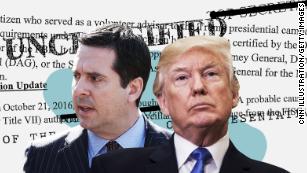The Memo and What it Means
February 4, 2018
On Friday, February 2, Donald Trump declassified a four-page memo, which was written by aides and Devin Nunes, the “chairman of the House intelligence committee, a staunch defender of Donald Trump and a member of his transition team” (The Guardian).
Why does this matter? Well, the memo alleges that the FBI abused its power while looking into Russian-ties with the Trump campaign. The content of the memo is centered around the FBI’s surveillance of Carter Page. Page is Trump’s former campaign adviser who stated in 2013 that he, “had the privilege to serve as an informal advisor to the staff of the Kremlin” (Axios). The memo alleges that the investigation into Page was politically motivated and not properly authorized.
The FBI initially began the investigation into Page after he flew to Moscow and met with Russian officials in 2016 while he was a campaign advisor to Trump. After hearing of this, the FBI and Department of Justice filed an application to a Foreign Intelligence Surveillance Act (FISA) court so they could begin watching Page. “The court granted the application” (Vox).
The memo alleges that the FBI began surveilling Page due to the infamous Steele dossier. This was a “document prepared by former British spy Christopher Steele alleging the existence of a conspiracy between Donald Trump and the Russian government. Steele’s research was, partially and indirectly, financed by the Clinton campaign — which the memo alleges is a major problem” (Vox). Vox reported that Steele is a well-respected investigator and some of his findings have proven to be true. Therefore, even if the FBI had relied on Steele’s investigation, it may still be credible.
There is skepticism on whether the contents of the memo are in fact true. Vox reported, “when news broke in mid-January that Nunes had been working in secret to prepare a memo on FBI surveillance of the Trump campaign, the initial sense among intelligence experts was that it would be…— Nunes misrepresenting intelligence to support President Trump’s political position.”
While the contents of the memo may not be true, the implications may be far-reaching. The Guardian reported, “The memo has raised concerns that the president is looking for a pretext to undermine or discredit the special counsel investigation, which now encompasses potential obstruction of justice by the White House.” There is reason to believe this, however, if special counsel Robert Mueller is fired, it’ll be a stretch.
The man who currently has the power to fire Mueller, and effectively end the Russia investigation, is Deputy Attorney General Rod Rosenstein. Rosenstein is mentioned in the memo as someone who signed off on a warrant for Page’s surveillance. The New York Times reported, “Republicans could potentially use Mr. Rosenstein’s decision to approve the renewal to suggest that he failed to properly vet a highly sensitive application for a warrant to spy on Mr. Page.” Rosenstein expressed no interest in firing Mueller back in December, but if this memo were to lead to Rosenstein’s firing, then a more Trump-friendly option could replace him to fire Mueller.
Republican John McCain responded to the memo by writing, “The latest attacks on the FBI and Department of Justice serve no American interests — no party’s, no president’s, only Putin’s…”






